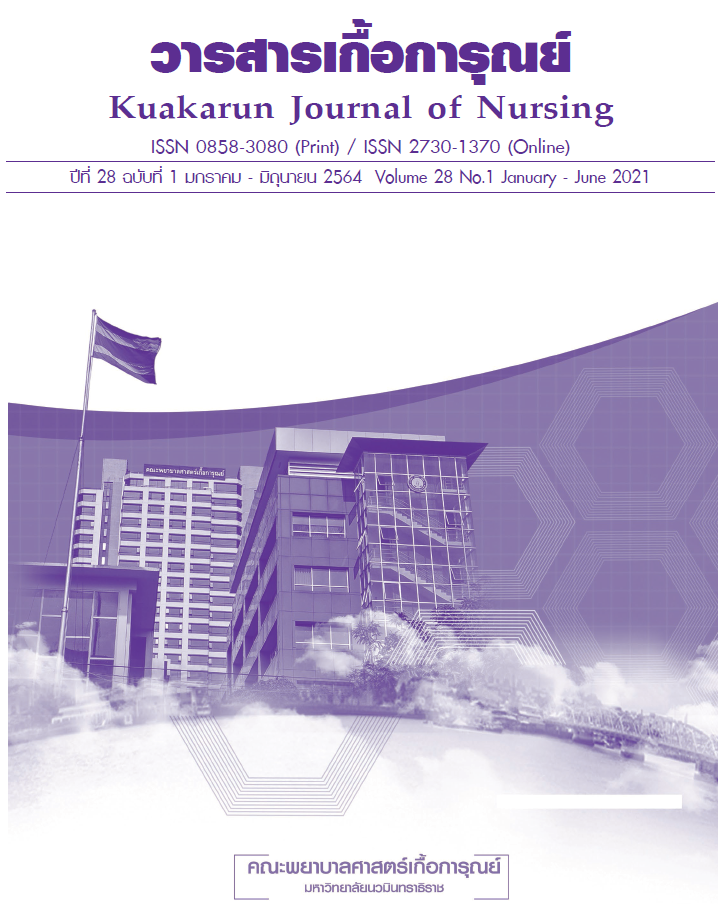โปรแกรมส่งเสริมพฤติกรรมป้องกันการกลับเป็นซ้ำของผู้ป่วย โรคหลอดเลือดสมอง
คำสำคัญ:
พฤติกรรมป้องกัน, การกลับเป็นซ้ำ, ผู้ป่วยโรคหลอดเลือดสมองบทคัดย่อ
การวิจัยกึ่งทดลองแบบสองกลุ่ม วัดผลก่อนทดลองและหลังทดลอง และในระยะติดตามผลนี้ มีวัตถุประสงค์เพื่อศึกษาผลของโปรแกรมส่งเสริมพฤติกรรมป้องกันการกลับเป็นซ้ำของผู้ป่วยโรคหลอดเลือดสมอง กลุ่มตัวอย่างเป็นผู้ป่วยโรคหลอดเลือดสมองที่อาศัยอยู่ในเขตลาดกระบัง กรุงเทพมหานคร จำนวน 56 คน แบ่งเป็นกลุ่มเข้าร่วมโปรแกรม 28 คน และกลุ่มเปรียบเทียบ 28 คน กลุ่มเข้าร่วมโปรแกรมจะได้รับการส่งเสริมพฤติกรรมป้องกันการกลับเป็นซ้ำที่ประยุกต์ใช้แบบจำลองการให้ข้อมูลข่าวสาร การสร้างแรงจูงใจ และการพัฒนาทักษะ โปรแกรมประกอบด้วยการให้ข้อมูลเรื่องอาการเตือน ภาวะแทรกซ้อน และผลกระทบจากการกลับเป็นซ้ำของโรคหลอดเลือดสมอง การเรียนรู้จากตัวแบบเชิงบวก ฝึกทักษะการออกกำลังกาย การเลือกซื้ออาหาร กลุ่มเปรียบเทียบได้รับการพยาบาลตามระบบปกติ เก็บรวบรวมข้อมูลโดยการสัมภาษณ์ด้วยการตอบแบบสอบถาม เครื่องมือที่ใช้ในการเก็บรวบรวมข้อมูลประกอบด้วย ข้อมูลส่วนบุคคล และแบบสอบถามพฤติกรรมป้องกันการกลับเป็นซ้ำของผู้ป่วยโรคหลอดเลือดสมอง ซึ่งมีค่าความตรงเชิงเนื้อหาเท่ากับ .93 และมีค่าความเชื่อมั่นสัมประสิทธิ์แอลฟาของครอนบาคเท่ากับ .72 วิเคราะห์ข้อมูลโดยใช้สถิติพรรณนา สถิติไคสแควร์ สถิติทดสอบค่าทีและสถิติวิเคราะห์ความแปรปรวนทางเดียวแบบวัดซ้ำ
ผลการวิจัย พบว่า ภายหลังได้รับโปรแกรมและในระยะติดตามผล กลุ่มที่เข้าร่วมโปรแกรมมีคะแนนเฉลี่ยพฤติกรรมการป้องกันการกลับเป็นซ้ำสูงกว่าก่อนเข้าร่วมโปรแกรม และสูงกว่ากลุ่มเปรียบเทียบอย่างมี นัยสำคัญทางสถิติ (p-value < .05) สรุปผลการวิจัยว่าโปรแกรมส่งเสริมพฤติกรรมป้องกันการกลับเป็นซ้ำ ของผู้ป่วยโรคหลอดเลือดสมองสามารถทำให้ผู้ป่วยโรคหลอดเลือดสมองเกิดทักษะที่ส่งผลให้เกิด การปรับเปลี่ยนพฤติกรรมการรับประทานอาหาร การออกกำลังกาย การรับประทานยา การไปพบแพทย์ตามนัด และการสังเกตอาการเตือนดีขึ้น ดังนั้น ควรนำโปรแกรมนี้ไปใช้ในการป้องกันการกลับเป็นซ้ำของผู้ป่วย โรคหลอดเลือดสมอง และใช้ส่งเสริมสุขภาพ ป้องกันผู้ที่มีภาวะเสี่ยงในการเกิดโรคหลอดเลือดสมองต่อไป
เอกสารอ้างอิง
Puwarawuttipanit W. Comprehensive care for stroke patients. Bangkok: N P Press Limited Partnership; 2009. (in Thai)
Tiamkao S. Recurrent ischemic stroke in Srinagarind hospital. North-Eastern Thai Journal Neuroscience 2011;6(3):31-8. (in Thai)
Khumsa-ard S, Thiangtham W, Suwan-ampai P. Behavior factors related to recurrent stroke. Journal Public Health Nurse 2017;31 Suppl 1:S13-25. (in Thai)
Piravej K. Management of acute ischemic stroke, neuropsychiatric aspects of stroke. Bangkok: Printing Press of Chulalongkorn University; 2009. (in Thai)
Kumpangkaew K, Somboontanont W, Leelahakul V. Relationships between perceived risk, perceived warning signs and self-care behavior in older adults at risk of cerebrovascular disease. Nurse Journal Ministry Public Health 2015;25(2):40-56. (in Thai)
Puthawong W, Kittipichai W, Silawan T, Munsawaengsub C. Cerebrovascular disease risk factors among hypertensive patients in Phayao province. Thai Journal of Public Health 2014;44(1):30-44. (in Thai)
Laloon P, Madhyamankura N, Malarat A. Self-care behavior of hypertensive patients at outpatient department of HRH Princess Maha Chakri Sirindhorn Medical Center. Journal of Medicine and Health Sciences 2011;18(3):160-9. (in Thai)
Assantachai P. Common health problems in the elderly and prevention. 2nd ed. Bangkok: Faculty of Medicine Siriraj Hospital, Mahidol University; 2011. (in Thai)
Sookwong D, Chantamoon W. The effect of guide line development to control recurrent stroke in transient ischemic attack patients with nurse management system toward the warning signs perception and the disease control behaviors in transient ischemic attack patients. Academic Journal RPS/RPT County 4 2013;15(3):190-6. (in Thai)
Division of Non Communicable Diseases, Department of Disease Control, Ministry of Public Health. Annual report of the bureau of non-communicable diseases, 2018. Bangkok: The War Veterans Organization of Thailand Under Royal Patronage of His Majesty the King; 2016. (in Thai)
Bangkok Health Center 45 Report system: Home Health Care. Bangkok. Bangkok Health Center 45, 2019. Contract No. 02-5430746. (in Thai)
Bangkok Health Center 46, Bangkok Health Center 46 Report system: Home Health Care. Bangkok Health Center 46, 2019. Contract No. 02-3290320. (in Thai)
Fisher JD, Fisher WA, Bryan AD, Misovich SJ. Information-motivation-behavioral skills model-based HIV risk behavior change intervention for inner-city high school youth. Health Psychology 2002;21(2):177-86.
Pasukunthapuk N, Borisut S, Pinyopasakul W. Clinical nursing practice guidelines for stroke. Bangkok: Prasat Neurological Institute; 2017. (in Thai)
Tantirittisak T. Clinical practice guidelines: dementia. Bangkok: Prasat Neurological Institute; 2014. (in Thai)
Nuntharuksa C, Phutthikhamin N. Hope with rehabilitation period among stroke patients. North-Eastern Thai Journal of Neuroscience 2013;8(2):35-55. (in Thai)
Joychoo N, Pinyopasakul W, Chareonkitkarn V. Relationships among age, perceived benefitsof health behaviors, perceived barriers of health behaviors and health behaviors in patients with ischemic stroke. Ramathibodi Nursing Journal 2014;20(2):236-48. (in Thai)

















